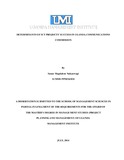| dc.contributor.author | NAKANWAGI, Susan Magdalene | |
| dc.contributor.author | Dr. Karyeija, Gerald (Supervisor) | |
| dc.contributor.author | OLUKA, Prosy Nagitta (Supervisor) | |
| dc.date.accessioned | 2017-06-05T12:23:18Z | |
| dc.date.available | 2017-06-05T12:23:18Z | |
| dc.date.issued | 2014-07 | |
| dc.identifier.citation | APA | en_US |
| dc.identifier.other | 11/MMS PPM/24/034 | |
| dc.identifier.uri | http://hdl.handle.net/20.500.12305/160 | |
| dc.description | A Dissertation Submitted to the Higher Degrees Department in Partial Fulfillment of the Requirements for the Award of a Master’s Degree in Management Studies (Project Planning and Management Option) of Uganda Management Institute. | en_US |
| dc.description.abstract | The purpose of the study was to establish the relationship between planning, organizing, controlling and success of information and communication technology projects in Uganda Communications Commission (UCC). The study was guided by three objectives, that is; to determine the relationship between planning and project success, to find out the relationship between organizing and project success, and to examine the relationship between controlling and project success. A co-relational research design was employed using both qualitative and quantitative research approaches. A sample of 84 respondents participated in the study by answering the questionnaire and interview guide. Questionnaires and interview guides were used to collect quantitative and qualitative data. Frequencies and percentages were used to show the distribution of staff on different items. Pearson’s Linear Correlation Coefficient (r) was used to determine the degree of relationship between the variables. The study findings showed that; planning, organizing and controlling have a positive relationship with project success in UCC, with Pearson correlation results showing; 0.555**, 510** and 728**, respectively. From the study findings, the researcher concluded that planning helps to ensure that project implementation is done within the established timeframe and within the stipulated budget; organising helps to ensure that people with the right experience and expertise are identified to run the projects; while controlling helps to ensure that there is effective monitoring and supervision of the projects, all of which would translate into project success. Thus, the researcher recommends that as part of planning, UCC needs to ensure the right infrastructure is in place and that the performance outcomes are stated clearly from the onset. In organising, UCC needs to pay attention to accountability, reliability and transparency, while effective controls should be ensured such that the established plans can be realized. | en_US |
| dc.language.iso | en | en_US |
| dc.publisher | Uganda Management Institute | en_US |
| dc.subject | ICT Projects | en_US |
| dc.subject | Uganda Communications Commission | en_US |
| dc.subject | Determinants | en_US |
| dc.title | Determinants of ICT Projects’ Success in Uganda Communications Commission | en_US |
| dc.type | Thesis | en_US |

